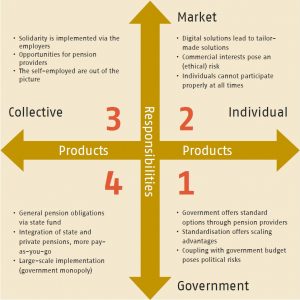Netspar explores scenarios for pensions after 2036: whatever happens, sitting back is not an option
The new pension system will not be introduced until around 2026, but a team of experts from the independent knowledge network Netspar has already considered scenarios for 2036 and beyond. These scenarios can be advantageous for the government, pension providers, people building up their pensions and other players when considering an uncertain future. The most important conclusion: whatever the transition will bring, no one can sit back.
 |
In scenario 1, government-individual, the government is the main provider of various pension options and people building up their pensions can choose from standard packages. In scenario 2, market-individual, not the government but the market is the main provider. People building up their pensions can and must choose from many options and need help doing so. In scenario 3, market-collective, the market is the main provider and people building up their pensions have little choice. And in scenario 4, government-collective, the government is the main provider and pensions are to a large extent regulated from above. |
As usual with so-called scenario studies, it is not about which scenario actually plays out. The scenarios help the various parties to prepare for possible developments.
Fieke van der Lecq, professor of Pension Markets at VU Amsterdam: “The questions we wanted to answer with our scenario analysis are: How is someone who is accruing their pension helped with financial retirement planning? Who is responsible for what?”
A striking conclusion is that each scenario requires an active government. In the years ahead, the government must, for example, already implement the legislation and regulations to ensure that the relevant parties fulfil their tasks optimally. In addition, the government must guarantee privacy and supervisory authorities will have to cooperate more.
Furthermore, in most scenarios, tech companies are of increasing importance for pension provision, pension administration, asset management and the provision of information and advice. People accruing pensions can benefit from this, but the government must build in safeguards to ensure that market participants act fairly and ethically, including when they use the technology developed by tech companies.
René Maatman, professor of Asset Management and Pension Matters at Radboud University Nijmegen: “We cannot calmly wait until 2036. The legislative process takes years, meaning that we must think now, during the transition to 2026, about the possible consequences in 2036. Because only then can the government, employers, pension providers, advisers and regulators meet the future needs of people building up their pensions in time.”
Publication
Read the paper “Verantwoordelijkheidsverdeling rond planning pensioenvoorziening” (in Dutch) by Fieke van der Lecq (VU), René Maatman (RU), Mark Irwin (TKP Pensioen), Raoul Salden (APG), Jop Versteegt (Achmea), Roel Wilms (MN).


